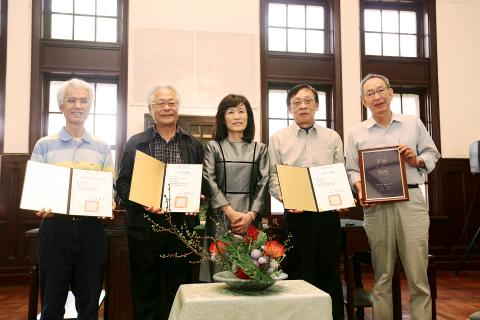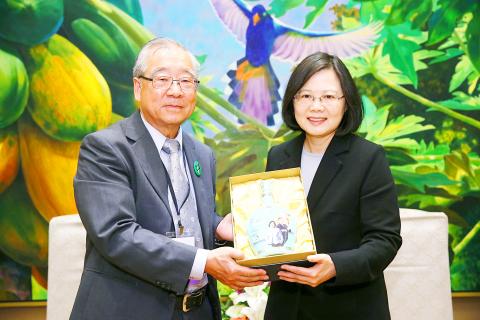President Tsai Ing-wen (蔡英文) yesterday said that the government would take the lead in investigating the 228 Incident and find those accountable for the tragic chapter in the nation’s history.
The government will investigate the Incident, present the truth and pursue those who are accountable to remedy the current status of “only victims, but no perpetrators,” the president said.
“We will not forget [the mission], nor will we circumvent it,” she said.

Photo: CNA
Tsai said she wants to let society reflect more deeply on the mistakes of the Incident, learn from it and move toward reconciliation to create a “democratic, just and united nation.”
The 228 Incident was triggered by a clash between government officials and an illegal cigarette vendor on Feb. 27, 1947. The event turned into an anti-government uprising and was violently put down by the then-Chinese Nationalist Party (KMT) regime.
An estimated 18,000 to 28,000 people were killed during the crackdown, which lasted for several weeks into early May that year, according to an investigation commissioned by the Executive Yuan in 1992.

Photo: CNA
Tsai made the remarks while receiving an overseas group consisting of family members of some of the victims, who were accompanied by Overseas Community Affairs Council Deputy Minister Tien Chiu-chin (田秋蓳), in a closed-door meeting.
“I will instruct related government agencies to continue to sort the files from the authoritarian era, so that the truth that has been kept in the dark for 70 years will come to light,” the president said.
In her address to the group, Tsai was quoted in a news release as saying that this year marks the 70th anniversary of the Incident, adding that Taiwan lost almost a whole generation of its elite due to the mistakes committed by the authoritarian rulers of the time.
“Even today, Taiwanese are still suffering from the consequences of the 228 Incident,” she said.
After Taiwan became democratic, people were finally able to openly discuss the Incident, she said.
The government has admitted mistakes, apologized, set up monuments and has probed the truth. It has also rehabilitated the names of victims and compensated their families in a bid to heal the trauma.
However, the president said she knows clearly that for the families of the victims, the government’s work is far from complete.
“We should not forget history, nor our trauma,” she said.
She said that she attended a Holocaust Remembrance Day activity in Taipei on Sunday and acutely felt the courage of Germany in facing its historical mistakes.
She pointed out that the German government, academics and the private sector have continued to probe the historical facts in a bid to more carefully dig out the truth and have continued to prosecute Nazi war criminals.
Germany’s experience is inspirational to Taiwan, she said, adding that the pursuit of historical truth and the preservation of history are long-term social goals.
The government has an obligation to continue to more thoroughly probe the truth of the Incident in an open and transparent manner so that the accountability of those responsible can be more clear and detailed, she said.
Among the files collected by the Archive Bureau, only a few have yet to be declassified, Tsai said.
She said that as far as she knows, four files belong to the Overseas Community Affairs Council, which is coordinating the process “to declassify them as soon as possible.”

The Taiwanese passport ranked 33rd in a global listing of passports by convenience this month, rising three places from last month’s ranking, but matching its position in January last year. The Henley Passport Index, an international ranking of passports by the number of designations its holder can travel to without a visa, showed that the Taiwan passport enables holders to travel to 139 countries and territories without a visa. Singapore’s passport was ranked the most powerful with visa-free access to 192 destinations out of 227, according to the index published on Tuesday by UK-based migration investment consultancy firm Henley and Partners. Japan’s and

NATIONAL SECURITY THREAT: An official said that Guan Guan’s comments had gone beyond the threshold of free speech, as she advocated for the destruction of the ROC China-born media influencer Guan Guan’s (關關) residency permit has been revoked for repeatedly posting pro-China content that threatens national security, the National Immigration Agency said yesterday. Guan Guan has said many controversial things in her videos posted to Douyin (抖音), including “the red flag will soon be painted all over Taiwan” and “Taiwan is an inseparable part of China,” while expressing hope for expedited “reunification.” The agency received multiple reports alleging that Guan Guan had advocated for armed reunification last year. After investigating, the agency last month issued a notice requiring her to appear and account for her actions. Guan Guan appeared as required,

Japan and the Philippines yesterday signed a defense pact that would allow the tax-free provision of ammunition, fuel, food and other necessities when their forces stage joint training to boost deterrence against China’s growing aggression in the region and to bolster their preparation for natural disasters. Japan has faced increasing political, trade and security tensions with China, which was angered by Japanese Prime Minister Sanae Takaichi’s remark that a Chinese attack on Taiwan would be a survival-threatening situation for Japan, triggering a military response. Japan and the Philippines have also had separate territorial conflicts with Beijing in the East and South China

A strong cold air mass is expected to arrive tonight, bringing a change in weather and a drop in temperature, the Central Weather Administration (CWA) said. The coldest time would be early on Thursday morning, with temperatures in some areas dipping as low as 8°C, it said. Daytime highs yesterday were 22°C to 24°C in northern and eastern Taiwan, and about 25°C to 28°C in the central and southern regions, it said. However, nighttime lows would dip to about 15°C to 16°C in central and northern Taiwan as well as the northeast, and 17°C to 19°C elsewhere, it said. Tropical Storm Nokaen, currently